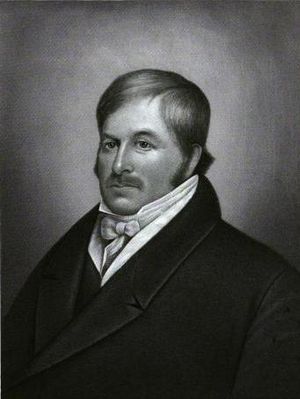Solomon Sibley facts for kids
Quick facts for kids
Solomon Sibley
|
|
|---|---|
 |
|
| 1st Mayor of Detroit, first charter | |
| In office 1806–1806 |
|
| Preceded by | None |
| Succeeded by | Elijah Brush |
| Delegate to the U.S. House of Representatives from Michigan Territory's at-large district |
|
| In office November 20, 1820 – March 3, 1823 |
|
| Preceded by | William Woodbridge |
| Succeeded by | Gabriel Richard |
| Personal details | |
| Born | October 7, 1769 Sutton, Massachusetts, U.S. |
| Died | April 4, 1846 (aged 76) Detroit, Michigan, U.S. |
| Political party | Democratic Democratic-Republican (before 1825) |
| Alma mater | Brown University |
| Profession | Lawyer |
Solomon Sibley (born October 7, 1769 – died April 4, 1846) was an important American politician and judge. He lived in the Michigan Territory and became the very first mayor of Detroit.
Contents
Solomon Sibley's Early Life and Career
Sibley was born in Sutton, Massachusetts. He went to college at what is now Brown University and graduated in 1794. After college, he studied law and became a lawyer in 1795.
He started his law practice in Marietta, Ohio. This area was then called the Northwest Territory. Soon after, he moved to Cincinnati and then to Detroit, Michigan, in 1797. At that time, Detroit had only two lawyers, and Sibley was one of them. Being a lawyer back then meant traveling long distances on horseback. He often rode through wild areas to reach courts.
First Election in Michigan
In December 1798, Detroit held its first election under United States rule. Solomon Sibley was elected to represent Wayne County in the Northwest Territory's government. He started his term in January 1799.
Sibley helped create the law in 1802 that made Detroit an official town. He was first chosen to lead the town's board. Then, in 1806, he became the first mayor of Detroit under its first city rules.
During the War of 1812, Sibley led a group of riflemen to defend Detroit. However, the British army successfully attacked, and the fort was surrendered. After the war, Sibley worked as the Auditor of Public Accounts for the Michigan Territory from 1814 to 1817.
Solomon Sibley: A Delegate in Congress
In 1815, U.S. President James Madison chose Sibley to be the first United States Attorney for the Michigan Territory. He held this job until 1823.
When William Woodbridge left his role as a delegate to the U.S. Congress in 1820, Sibley was elected to take his place. Sibley won re-election and served in Congress from November 20, 1820, to March 3, 1823. He was both a lawmaker and a government lawyer at the same time.
During this period, Sibley also helped negotiate an important agreement. With Lewis Cass, he worked on the 1821 Treaty of Chicago in 1821. In this treaty, the Ottawa, Potawatomi, and Chippewa tribes gave up much of their land south of the Grand River.
Solomon Sibley's Time on the Michigan Supreme Court
Sibley did not run for Congress again in 1822. In 1824, U.S. President James Monroe appointed him as one of three judges on the Michigan Territorial Supreme Court. He became the sixth judge on this court.
Sibley served as the chief judge of the court from 1827 until 1837. He had to leave his position in 1837 because he became deaf.
Solomon Sibley's Later Years and Family
Solomon Sibley married Sarah Whipple Sproat Sibley (1782–1851). They had eight children together.
One of their sons, Henry Hastings Sibley (born 1811), also became a politician. He represented the Wisconsin Territory and later the Minnesota Territory in Congress. He then became the first Governor of Minnesota. Another son, Alexander H. Sibley (born 1817), became the president of a silver mining company. Their daughter, Catherine Whipple Sibley, married Charles Christopher Trowbridge, who was also a mayor of Detroit.
Solomon Sibley passed away in Detroit and is buried in Elmwood Cemetery there. After he died, many lawyers wore a special badge of mourning for 30 days to honor him. His wife, Sarah, built the Sibley House in Detroit shortly after his death, and it is still standing today.
 | Frances Mary Albrier |
 | Whitney Young |
 | Muhammad Ali |

